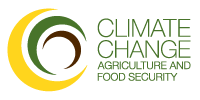The national meteorological services of ten African countries have collected historic data and monitored climate and weather information using participatory tools and approaches developed by the CGIAR Research Program on Climate Change, Agriculture and Food Security (CCAFS).
These tools have helped deliver climate information at a small enough scale for smallholder farmers to use in agricultural planning.
 May 2014: The national meteorological services of ten African countries have collected historic data and monitored climate and weather information using participatory tools and approaches developed by the CGIAR Research Program on Climate Change, Agriculture and Food Security (CCAFS). These tools have helped deliver climate information at a small enough scale for smallholder farmers to use in agricultural planning.
May 2014: The national meteorological services of ten African countries have collected historic data and monitored climate and weather information using participatory tools and approaches developed by the CGIAR Research Program on Climate Change, Agriculture and Food Security (CCAFS). These tools have helped deliver climate information at a small enough scale for smallholder farmers to use in agricultural planning.
Among the project outcomes, CCAFS has highlighted its success in replicating its approach across more than ten countries and its success in scaling up its climate information to reach tens of thousands of smallholder farmers across Africa. The national meteorological services of Ethiopia, Lesotho, Madagascar, Malawi, Senegal and Tanzania and the International Fund for Agricultural Development (IFAD) and the World Meteorological Organization (WMO) are among the countries and agencies using the CCAFS approach to collecting climate and weather information.
The US Agency for International Development (USAID), WMO, the International Research Institute for Climate and Society (IRI) and the University of Reading collaborated with CCAFS on the research and capacity building aspects of the project. [CCAFS Press Release] [CCFAS Outcome Case: Use of climate and weather information by various agencies, meteorological institutions and farmers]